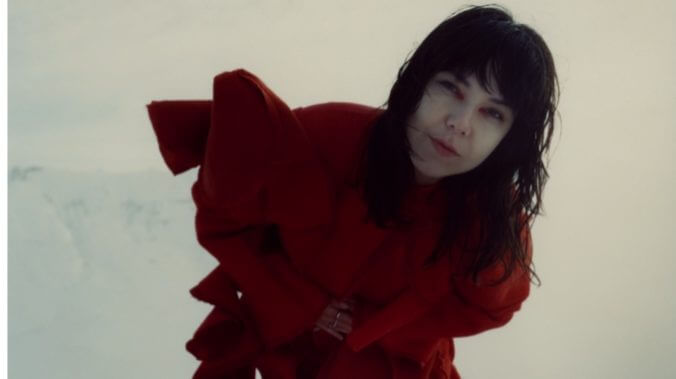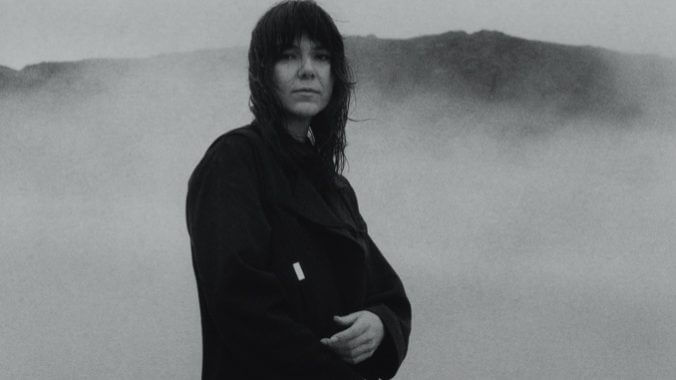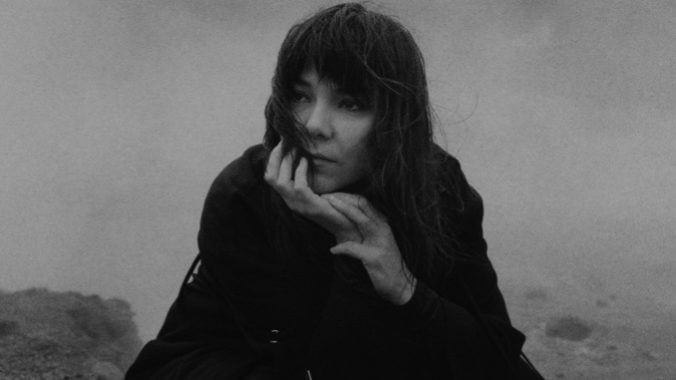Catching Up with Nanna from Of Monsters and Men
Photos by Angela Ricciardi
“Happiness is a warm puppy,” the late Peanuts cartoonist Charles M. Schulz once posited. And no one, not even John Wick, could agree more heartily with this sentimental adage than Icelandic folk-rocker Nanna Bryndis Hilmarsdottir, who acquired exactly that three years ago at the beginning of lockdown: A warm, but underweight Labrador puppy that, as the runt of her litter, nobody seemed to want. “I was obviously home as everyone else was in 2020, and I heard from a friend of a friend that there were these puppies that had been born, and I just went to visit because I was feeling curious,” recalls the Of Monsters and Men anchor, who—under the simpler sobriquet of just Nanna—bows in tomorrow, May 5, with her first solo set How To Start a Garden. She hadn’t planned on getting a pet, she says. But when she laid eyes on “the smallest one that was the only one left, I was like, ‘Okay—there’s no turning back now.’” She christened the dog Vofa—Icelandic for ‘Ghost’—and, as the pandemic bore down and thoughtful new songs bubbled up, happiness did, indeed, ensue.
And a warm, growing puppy can certainly come in handy on long winter nights in Iceland. Nanna maintains two residences— a basic apartment in Reykjavik and a conversely rustic cabin in the wilderness—and Vofa accompanies her everywhere, safely leashed in the city but happily off leash in the scenic countryside. And, just like similarly-isolated folks all over the Covid-constricted world, she bonded—seriously bonded—with her new pandemic pooch. For a decade, Nanna had gorgeously harmonized with Of Monsters and Men—a safety net, of sorts, stylistically. But for Garden, she had to muster the courage to step out on her own, which she did quite ably, aided by The National’s keen-eared Aaron Dessner in some songwriting and production on certain tracks, and producer Josh Kaufman on others. Courageous Vofa, she thinks, helped her find her confident new voice, as well. And the resulting 11 cuts flow seamlessly together, aligned by Nanna’s gentle but earthy warble, which can simultaneously fire up a dark bluesy rocker like “Crybaby,” drape itself in velvet luxury over willowy acoustic ballads (“Godzilla,” the bare-bones “Disaster Master,” and a shimmering “Sputnik”) or touch base with classic pop phraseology (“Igloo,” and the plush title track, buttressed by raindrop and bird-twittering sound effects). The Dessner-assisted closer “Seabed,” in fact, even manages to cloud her in aqueous mix that underscores her stark lyrical declaration of, “I was never lonely/ Now I’m feeling like an only child.” Hey—we all were roughly three years ago. And not everyone was lucky enough to have a companion like Vofa.
But this week Nanna is learning that canine separation anxiety can cut both ways. She’s in New York for her album’s release, with her beloved pet minding the fort(s) back in Iceland. It’s also her 34th birthday this weekend, May 6, she adds, “So I’m not gonna be with her, which is sad. But I have some friends who are coming in, and we’ll be sharing some good food and drinking a lot of wine. But sadly, Vofa won’t be here to lick all the dinner plates like she usually does…”

Paste: So getting a warm puppy just as lockdown was starting–how opportune was that?
Nanna: It was really great. And it was terrifying, too, to be honest. I guess just because you’re now responsible for something else, you know? You’re no longer just responsible for yourself. And there’s like structure to having a dog. And around that time, just coming home from tour and being in this whirlwind in the middle of a crazy thing? I was traveling, and then you come and you’re just like, really still. And then you have this tiny puppy, and then it’s pooping everywhere, and, you know, you have to be a caretaker. And being a caretaker was kind of terrifying to me. But then I really needed it, I think.
Paste: What lessons did Vofa teach you as she grew? She sounds crucial to your pandemic story.
Nanna: Yeah! I think she’s like—for this record that I’m about to release, it’s so much about trying to, I guess, find your roots. And trying to learn how to stay still or something like that? Like needing it, and the process of learning it. And when I got her, she was just a part of that whole process for me. And she comes into the songs. There’s one song, “Disaster Master,” where in the end I’m talking about “to start a garden, the ghost and me,” which is just me and her, really, starting something new. Because I was in kind of a strange time in my life when I was writing this record, and there so many things that were changing and ending, I guess, and I was trying to figure out how to start all over again. And she was just a part of that with me.
Paste: Call me curious. What was ending for you? A romantic relationship, I would imagine?
Nanna: Yeah, yeah—a relationship, and, you know, everything that kind of goes with that, I guess. And dogs are so much a part of your life. I mean, I had a dog with my partner, so that was also a house-breaking thing, where the dog would go. So it was a cathartic thing, making this record, just to build something new.
Paste: What wild adventures did you end up going on with Vofa as she grew?
-

-

-

-

-

-

-

-

-

-

-

-

-

-

-

-

-

-

-

-

-

-

-

-

-

-

-

-

-

-

-

-

-

-

-

-

-

-

-

-









































